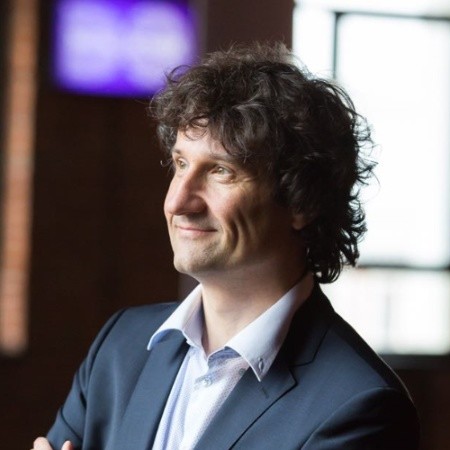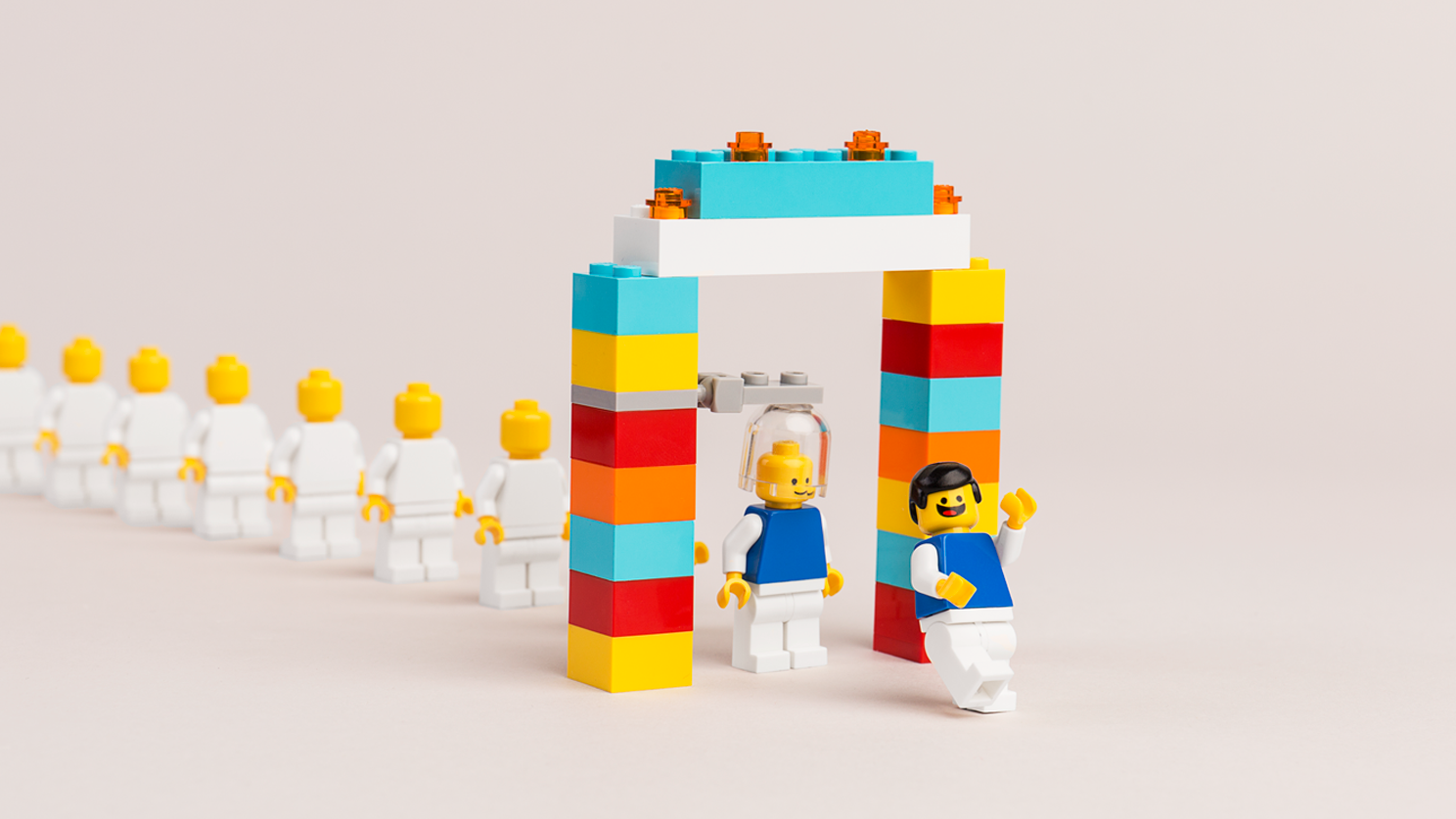
LAURENT ELLERBACH
Current position: Principal Software Engineer Manager at Microsoft
Education: Master’s degree in Marketing & Communication, ESCP Business School, France; Master’s degree in General Engineering, ENSAM, France
An entire engineering career at Microsoft doesn't sound quite common but Laurent Ellerbarck made it happen. How do you constantly reinvent yourself and your missions? How can employers still inspire you enough to retain you for a lifetime? Discover Laurent's amazing career path at Microsoft for 25 years in our interview.
Can you tell us more about your educational background and what brought you to Microsoft?
I’ve been writing code ever since I was a child. We had a computer with Basic in ROM at home and obviously you had to be able to code if you wanted to make anything with it. At that time, there wasn’t Github or even online communities like we know now. We traded our diskettes at school to progress and learned by doing or through magazines and books. I worked part-time as a programmer during my studies.
I started my cursus at the ENSAM Engineering School then pursued with a master’s degree in Marketing and Communication at the ESCP. As for any master’s, we had to find an internship to complete our degree. There were no emails and online job ads by then, we had to print our resume, our cover letter and send them via mail. I remember I sent mine everywhere I could on Friday – all the top edge computing companies – and on Monday already, I had a call from Microsoft. On Tuesday, I was passing 3 interviews with them and on Thursday I got a « yes ». Two weeks later, I was starting my internship at Microsoft, my very first – and last – employer.
What did it mean at that time to work for a company like Microsoft?
When I started there, there were about 300 employees in France which isn’t much compared to nowadays about 2,000 but still significant. Of course it was motivating. I was also familiar with their products as I was using them for coding. I’ve always appreciated Microsoft’s open API and later on open source approach, it’s easy and intuitive to code and do business with them. I had bought Visual Studio for example, which had an affordable price for students like me. It wasn’t always the case: I had hacked some products a few times when I was younger as I couldn’t afford them and I was very transparent about that during my interview. Luckily they seemed to appreciate my honesty. I also liked – and still do – what Bill Gates embodied. Finally, I admired and enjoyed their reactivity towards my application, especially knowing that the other companies took 2 to 3 weeks to answer me – if there was at least an answer. Microsoft showed sincere interest in my profile and took action immediately.
Could you give us an overview of your tech career?
The first half of my career at Microsoft was more focused on Audience Marketing, which means everything related to the developers, software engineers as we call them now, from a marketing point of view. It also included the «Education » aspect, like the relationships with the universities to train students to become future developers using as well Microsoft’s tools. I was able to initiate a lot of projects in these functions, like the « Imagine Cup » worldwide contest for example. Every year the competition gives students the opportunity to innovate on a real project that they like. I also worked on giving free access to many programming tools, co-created our Ambassadors programs. The first edition took place in 2003 and the contest is still going on. Obviously it has evolved over time, integrating new categories but always with the same purpose to start up a viable business that can live on after the contest. At that time I was working in line with the headquarters based in Seattle. I always proceeded the same way: I spotted the opportunities or potential breaches and suggested initiatives to launch. Our purpose wasn’t to propose technology only but to develop real ambitious projects around our products.
Over time social media have emerged, opening new doors. We created major events like « Microsoft TechDays » for developers and IT professionals to meet and share knowledge. As I was comfortable with these new communication channels, I was given more responsibilities and got to do a lot of things. Over time, I got eager to work more internationally. It was interesting and varied a lot depending on the countries but at a point, I felt like I had fulfilled my ambitions in the marketing field. I needed some change and new challenges.
At the same period, Satya Nadella – Microsoft’s current CEO – arrived and put the business focus back on technology. I had never stopped programming, but I started coding a lot more. I first made a transition in a function that combined marketing and tech as there was a specific need then shifted completely to tech positions. Currently, I am Principal Software Engineer Manager and do co-engineering for large clients aiming to achieve innovative projects around our technologies. Our mission is to combine our teams in one – in the agile sense – and to co-develop a solution all together. It’s not a service as we don’t do it for them, we do it with them. My daily routine is going to depend on which phase of the project we’re in. There are phases of scoping, envisioning, architecture and design, coding and demos and finally the feedback. To this you can also add all the management aspects.

What do you think is the foundation of your lifetime career at Microsoft?
From the very beginning, I had the possibility to innovate and bring ideas to life. During my internship for example, I created Microsoft France’s Education website. They just told me to go for it so I did. As soon as they saw that I had the necessary technical skills to create the pages, they gave me the access to the content and tools. I also created some demos. Clearly they have always encouraged me to be a source of proposals and have always trusted my work. This dynamic is, in my opinion, still very present at Microsoft. If you read our CEO Satya Nadella’s book « Hit refresh », innovation remains at the heart of the company and it translates into the everyday life and the company culture. Well, of course the work expected from you must be done but there’s always room for relevant and creative initiatives.
Throughout my career, I have fluctuated between marketing functions and more technical ones although they often combined the two dimensions. I had never stopped programming but it was more for myself, like a hobby on the side to stay on track. When Satya took up his CEO role, that’s when I decided to switch back to coding and tech after more than a decade in marketing. The company allows a huge internal staff mobility. If you demonstrate relevant expertise and leadership, you can shift from one role to another quite easily, even in another field.
Here’s another example: I’m a huge Lego fan and I also show strong interest in personal development. At a time I discovered the « Lego Serious Play » playful methodology, designed to enhance innovation and business performance. Hence I asked the permission to attend the training course with a view to becoming a Lego Serious Play Facilitator and once again, they encouraged me to follow through on my project. Afterwards, I applied this method internally and about one year and a half ago, I created my own workshop on Diversity & Inclusion, once again with the support of my hierarchy. We gave it a shot and it was a success therefore I have trained a bit more than 20 facilitators around the world since then. Long story short, I’ve always felt stimulated and supported throughout my career at Microsoft. There have always been opportunities to vary the missions, think bigger and bring new ideas to life. You never get bored!
In your opinion which key soft skills have you developed along your career and consider essential?
Curiosity I’d say. And also, whatever your position, interpersonal communication and team work: it’s important to be able to listen, exchange, ask the right questions and take feedbacks into consideration. It’s something to work on and to improve throughout your career. In my case, creating the « Diversity & Inclusion » workshop taught me a lot. I always say that 70% of your skills, you learn them on the job. 20% you learn from your peers and 10% you learn by yourself through books, trainings, webcasts, teaching… 10% represents about half a day per week. Take half a day each week to self-train and be curious.
What main challenges have you faced?
Microsoft has a fast changing-environment, the business model and the products change regularly. It forces you to adjust constantly to new technologies and organizations. Clearly you must be eager to learn to keep up.
If you had to do it all over again, would you change something?
Not really. I got many occasions to go working at the HQ in Seattle but for personal reasons I preferred to stay in France. Personal choices are also important, family, friends, life style.
A last recommendation for the new generation of engineers eager to work for a multinational company?
Be curious and connected, commit yourself and show interest in what you’re doing. Learning is important at any stage of a career. I’d also recommend working on your soft skills as hard skills aren’t enough. Of course, you need to be competent but the person bringing the most to a team isn’t necessarily the most technical one. It’s mostly the worker able to tackle the needs, who’s a good listener, who can motivate his coworkers and be the connection between them and what they achieve.



One Comment
GOod